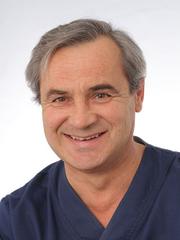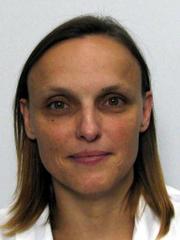Informed consent
-
This page provides more information about your stay and informed consent for necessary procedures. It is important for you to be aware of this.
-
Sometimes the urgency of the situation will not allow major interventions (for instance, an urgent intervention) to be discussed with you in advance. The doctor will then act in good conscience in the patient's best interest. Naturally, all necessary information will be provided afterwards.
-
We assume that the information here will suffice to adequately inform you.
Do you still have questions? Please be sure to ask them to one of the healthcare providers.
Welcome to our ICU
You or your loved one have been admitted to one of the two medical intensive care units associated with the general internal medicine department, where patients with a serious acute illness or a high risk of it reside. This illness or condition requires extra monitoring or intensive treatment.
There are two intensive care units within this department: Intensieve zorg 1 (the current ICU) and Intensieve zorg 2.
Within UZ Leuven there are other intensive care units, which are linked to the intensive medicine department (Intensieve zorg 5, Intensieve zorg 6, Intensieve zorg 7 and Intensieve zorg 8) or the cardiovascular diseases department (Intensieve zorg 4). All these departments work closely together.
To make your stay or that of your relative as smooth and pleasant as possible, you will find the most important information on this page. We hope this info will serve as a useful guide for you and your relatives during your admission to our intensive care unit.
Do you still have any questions?
-
If so, you can always contact the nurse caring for you or your loved one.
Your stay in an intensive care unit
On an intensive care unit, the patient's state of health is constantly closely monitored. The team of carers does everything possible to treat the patient to the best of their ability. Sometimes specialised tests or treatments are necessary.
Click below to read more about intensive care.
To continuously monitor the patient, we use a monitoring device or screen. Using these, we monitor various important bodily functions, such as heart rhythm and blood pressure. To track these, a catheter (tube) is often inserted into one or more veins.
Various devices may be used during intensive care treatment. For example, many patients need temporary respiratory support. A respirator connected to a breathing tube, which passes through the mouth into the trachea, is used for this purpose. During this treatment, the patient cannot speak. During this phase of treatment, some patients are also kept in a deep sleep. In addition, we sometimes use devices that (temporarily) take over the functioning of the heart or kidneys.
Powerful drugs of course play an important role in intensive care treatment. This medication is administered through a catheter (tube) in a large vein. Usually, this catheter is placed in the neck or just below the collarbone. For the patient's comfort, painkillers or sedative (anti-anxiety) drugs are often administered.
Several examinations happen during treatment:
- daily examination by the doctor
- regular blood and urine tests
- if necessary, examinations using equipment: radiological examinations (RX or CT scan, ultrasound), visual examinations (bronchoscopy, gastroscopy, coloscopy) ...
All these examinations are necessary for optimal treatment, even though they may pose a risk. This depends on the patient's general health condition.
It is important to know that the patient's freedom of movement is slightly restricted, usually when they are ventilated via a ventilator. We do this to ensure the patient's safety. For the same reason, a patient may need to be restrained if they were to become distraught due to being seriously ill or due to a problem in the brain.
Information via the healthcare providers
The care team keeps the patient and the relatives as informed as possible about the evaluation of the patient's health condition. This is done mainly during the visit moments and, in case of important changes, also by phone to a specific contact person of the family.
If possible, the patient is informed in advance of planned and/or additional examinations and operations. It may happen that healthcare providers need to intervene urgently, and that the situation thus doesn't enable them to discuss this with the patient in advance. In that case, the doctor will act in good faith in the interest of the patient or their representative. Afterwards, the necessary information will of course be provided.
Your room
On this ICU, men and women can be cared for in the same room. There is also no distinction between single and double rooms. The single rooms are used primarily for patients who must be cared for in isolation.
Photos, drawings or cards may be hung in the room to create a more familiar environment.
Flowers and plants are not allowed because of the risk of infection.
Address
Location and accessibility
Visits on an intensive care unit
Visiting hours
-
From May 2024, this department will test the feasibility of extended visiting hours, which will be evaluated in the autumn.
-
Visits are possible every day at set times:
- from 13:00 to 15:00
- from 19:00 to 20:30
-
Visits are limited to two visits per day.
Please come with a maximum of three visitors per patient at a time.
-
Children under 12 years of age are not allowed to visit.
- In exceptional cases, children's visits are desirable and will be allowed. This can be done after consultation with the head nurse.
-
Visitors must present themselves at the start of the visiting hour (13:00 or 19:00).
- Visitors may have to wait briefly in the waiting room. A caregiver will always come by to let you in.
- Visitors are not obligated to stay for the entire time slot. Feel free to visit for half an hour.
-
Caregivers can always ask you to leave the room briefly to carry out the necessary care, including during visits.
-
Any exceptions to the standard visiting times can be requested and discussed with the ICU's head nurse and/or supervisor.
First visit
The first visit to a patient in an intensive care unit can feel rather overwhelming, because of the equipment around the bed and the various tubes, dressings and stickers on the body. If the patient is being ventilated through a tube in the throat, this will prevent them from talking. Ask the nurse how you can make contact with the patient, for example by talking to them or touching them.
The patient may experience delirium during admission: an acutely distraught state, cognitive problems or attention disorders. Read more about delirium and how you can help prevent delirium as a loved one here.
Information by telephone
Despite the limited visiting opportunities, as a close relative you can call day or night for information on the patient's state of health on the ward's general telephone number. Once they are on the mend, you can call the patient yourself. At busy times, we may ask you to call back at another time (e.g. around dinner time, when the healthcare provider caring for the patient is quite busy).
Waiting room
We kindly ask you to be present in the waiting room at the start of the visiting hour.
You may have to wait a while, for example because the patient has to undergo an examination that could not be scheduled at any other time or because the patient needs urgent care. Rarely, it may also happen that the patient's condition suddenly deteriorates.
Talking to the doctor
If you want to speak to a doctor, ask the nurse caring for the patient. Due to the intensive nature of the unit, the doctor may not be available immediately.
Contact
-
Head nurse: Carla Mathys
-
Nurses: +32 16 34 40 80 (available 24 hours a day)
After your admission
As soon as the patient's state of health permits, the patient may be transferred from the intensive care unit back to a regular hospitalisation ward.
During the course of the day, it is usually clear whether the transfer is possible and whether there is a room on an ordinary ward. If you as a relative call to enquire about this around noon, we can give you further information. This will allow you to prepare for any visit later in the day.
In very exceptional cases, patients can go straight home after their stay in an intensive care unit.
Going home: more information
Have you been given permission to go home? Then you will find more information on this page about help and support at home and the necessary paperwork, among other things.
Give your feedback for even better care
-
Every patient admitted to UZ Leuven can fill in the "Vlaamse Patiëntenpeiling" (Flemish Patient Survey). This can be done via the Octopuz screen at the bedside ('Surveys' button) or via mynexuzhealth (you will receive an invitation via mail and/or in the app after admission). By sharing your experiences at the hospital with us via this survey, you help to improve care and services for all patients.
Team
Staff members
In the Intensieve zorg 1 ICU, you can call on a number of permanent medical staff members.
Furthermore, Intensieve zorg 1 and Intensieve zorg 2 work closely with staff members from other departments within the internal medicine department and the cardiovascular disease department.
Permanent medical staff at Intensieve zorg 1
Staff members on general internal medicine
Staff members on cardiovascular diseases
Extra support - The social worker
Are you worried about your illness, family, work or financial situation? Both you and your family members are welcome to have a confidential conversation with the social worker.
The social worker will work together with you to find solutions, give advice on social services to which you are entitled and will help you with questions about insurance and certificates. If needed, the social worker will refer you to external services.
Ask the nurse or call in person on +32 16 34 86 20.
In need of conversation or a listening ear? Ask for the pastor.
Illness and hospitalisation are often thought-provoking. Do you need a quiet, confidential conversation?
There is a pastor working in the ward who - regardless of your philosophy of life - can lend a listening ear if you are having a difficult time or have life questions.
Ask for a pastor via the nurse.










